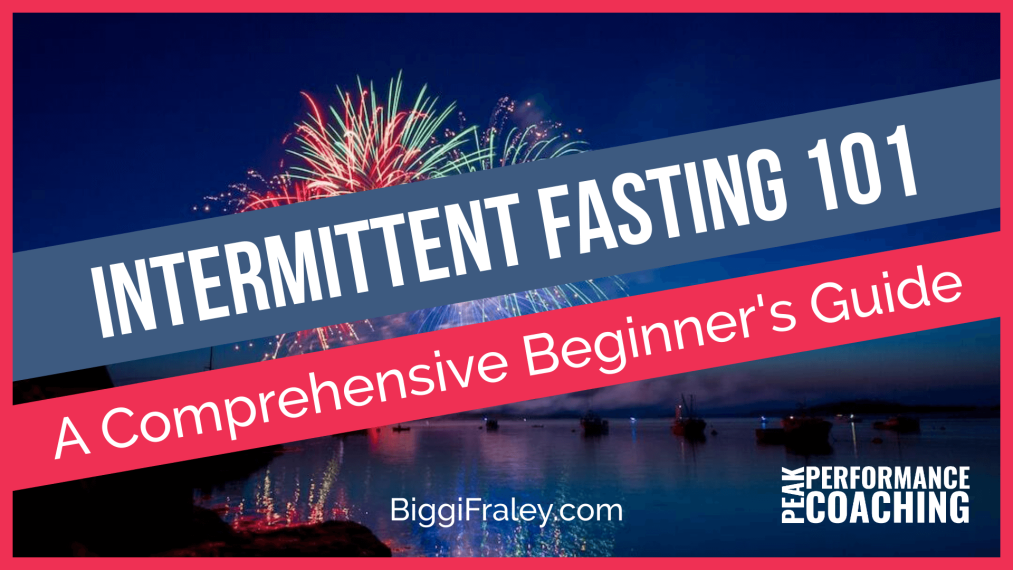
Are you caught in a constant struggle with stubborn weight that just won’t budge? I’ve been there too, and it led me to discover Intermittent Fasting (IF), an eating pattern supported by research to aid in sustainable weight loss.
This post is your comprehensive beginner’s guide on intermittent fasting 101, detailing various methods, its impact on your body, potential health benefits and risks involved. Ready for a life-changing journey towards improved health? Let’s dive right into the world of intermittent fasting!
Key Takeaways
- Intermittent fasting involves alternating periods of eating and fasting, focusing more on when you eat rather than what you eat.
- Different methods of intermittent fasting include the 16/8 method, the 5: 2 Diet, Alternate Day Fasting, and Eat-Stop-Eat.
- Intermittent fasting can positively impact your body by influencing cells and hormones, leading to weight loss, improved heart health, mental wellness, and potentially reduced cancer risk.
Intermittent Fasting (IF) is an eating pattern that involves alternating periods of fasting and eating.
Intermittent fasting, simply put, is a pattern of eating where you alternate between periods of eating and not eating. It’s not so much about which foods to eat but more about when to eat them.
Some popular methods involve fasting for 16 hours each day or 24 hours once or twice every week. The goal isn’t necessarily about consuming fewer calories, but it often results in that as well.
Many people find intermittent fasting an easy strategy for weight management because it doesn’t require meal planning or counting calories — just a watch!
Intermittent fasting is a structured approach, with schedules allowing alternation between eating and fasting times. It doesn’t restrict what you eat but emphasizes when to eat. You might follow something like the 16/8 method, which involves a daily 16-hour fast and an eight-hour eating window.
In contrast, regular fasting means completely abstaining from food for certain periods. This can span from 24 hours to several days at once without consuming any calories whatsoever.
While both approaches can lead to calorie reduction and potential weight loss, they distinctly differ in their application and level of difficulty.
There are several different methods of intermittent fasting, many of which I write about on this site, including the 16/8 Method, the 5:2 Diet, Alternate Day Fasting, and Eat-Stop-Eat.

When it’s time to break your fast, eat your meals slowly and mindfully.
The 16/8 method is a popular form of intermittent fasting. You basically split your day into two segments: an eating period of 8 hours and a fasting window of 16 hours. During the fasting phase, you can drink non-caloric beverages such as water or black coffee to stave off hunger pangs.
What’s great about this method is its flexibility – it focuses more on when you eat rather than what you eat. This means you’re free to combine it with any kind of healthy diet plan that suits your preferences, whether that’s plant-based meals or counting macronutrients.
Just like traditional calorie-restricted diets, the 16/8 method can effectively aid in weight loss if followed correctly and consistently!
The 5:2 Diet is a popular intermittent fasting method that involves eating normally for five days and limiting calorie intake to 500-600 calories for two non-consecutive days. This approach provides flexibility in choosing which days to fast, making it easier to fit into your schedule.
On fasting days, you can consume small meals or snacks totaling the restricted calorie amount. Research has shown that the 5:2 Diet can lead to an average weight loss of 3-8% over a period of 3-12 months.
Additionally, this diet may offer health benefits like improved insulin sensitivity, reduced inflammation, and better brain health.
Alternate Day Fasting is a method of intermittent fasting where you fast for a full 24 hours every other day. It can be an effective way to achieve weight loss, with studies showing that intermittent fasting can lead to 3-8% weight loss over 3-24 weeks.
It has also been found to improve insulin sensitivity and lower blood sugar levels, reducing the risk of type 2 diabetes. Alternate Day Fasting may also have anti-aging effects, making it a popular choice for women over 50 who are looking to improve their overall health and wellness.
The Eat-Stop-Eat method is a form of intermittent fasting that involves fasting for 24 hours once or twice a week. This approach can lead to weight loss of 3-8% over a period of 3-24 weeks.
By following the Eat-Stop-Eat method, you can improve insulin sensitivity and lower blood sugar levels, reducing the risk of type 2 diabetes. Additionally, this form of intermittent fasting may have anti-inflammatory effects and potentially prevent cancer.
However, it’s important to note that individuals who are underweight, have a history of eating disorders, or have certain medical conditions should avoid following the Eat-Stop-Eat method.
Intermittent fasting affects your body by impacting cells and hormones, leading to weight loss, improved heart health, mental wellness, and reduced cancer risk. Discover the transformative effects of intermittent fasting on your overall well-being!
Intermittent fasting can have a significant impact on cells and hormones in our bodies. When we fast, our insulin levels decrease and this allows our body to start burning stored fat for energy.
This process also increases the release of human growth hormone (HGH), which helps with fat burning and muscle gain. Additionally, intermittent fasting triggers a cellular repair process called autophagy, where damaged cells are broken down and recycled.
This has the potential to protect against chronic diseases and may even have anti-aging effects. Overall, intermittent fasting can positively influence our cellular health and hormone regulation, leading to improved overall wellness.
Intermittent fasting offers a range of health benefits, including weight loss, improved heart health, enhanced mental wellness, and potential reduction in the risk of cancer.

Before starting any new dietary or lifestyle changes, it’s advisable to consult with a healthcare professional.
Intermittent fasting has gained popularity as a weight loss strategy, and for good reason. It can lead to significant weight loss of 3-8% over a period of 3-24 weeks. By reducing calorie intake and increasing metabolic rate, intermittent fasting helps in shedding those extra pounds.
Not only that, but it also simplifies your healthy lifestyle by reducing the number of meals you need to plan and prepare. However, it’s important to note that intermittent fasting is not recommended for individuals who are underweight or have a history of eating disorders.
If you’re looking to lose weight and improve your overall health, intermittent fasting may be worth considering.
Intermittent fasting can also have positive effects on heart health. Studies indicate that it can lower LDL cholesterol and triglyceride levels, which are risk factors for heart disease.
Additionally, intermittent fasting may help reduce inflammation in the body, which is linked to heart conditions. Improved insulin sensitivity and lower blood sugar levels associated with intermittent fasting can also lower the risk of type 2 diabetes, a condition that increases the chances of developing heart disease.
Moreover, adopting an intermittent fasting eating pattern can simplify your lifestyle by reducing the number of meals you need to plan and prepare, making it easier to maintain a heart-healthy diet.
Intermittent fasting is not only beneficial for physical health but also has a positive impact on mental wellness. It can reduce stress and promote clarity of mind, allowing you to feel more calm and centered throughout the day.
Additionally, intermittent fasting has been associated with improved mood and an increase in the production of brain-derived neurotrophic factor (BDNF), a protein that supports the growth and development of nerve cells in the brain.
By incorporating intermittent fasting into your routine, you may experience enhanced mental well-being as part of your overall wellness journey.
Intermittent fasting has been found to have potential cancer-preventive effects according to studies. Research suggests that intermittent fasting may reduce the risk of cancer or slow down cancer growth, although more research is still needed to fully understand its benefits for cancer reduction.
It’s important to remember that intermittent fasting is just one of many lifestyle strategies that can improve overall health and should not replace medical treatments for cancer. If you have a history of eating disorders or certain medical conditions, it is always recommended to consult with your healthcare professional before starting intermittent fasting.
Intermittent fasting, like any dietary practice, comes with potential risks and side effects. These can include headaches, fatigue, mood changes, dehydration, and even malnutrition if not done properly.

Getting enough quality sleep is essential when practicing intermittent fasting.
It is important to be aware of these potential risks before starting an intermittent fasting regimen.
Some individuals may experience headaches as their bodies adjust to the new eating routine. These headaches are often characterized by mild to moderate discomfort and can be triggered by factors such as dehydration, changes in blood sugar levels, or caffeine withdrawal.
To minimize the occurrence of headaches during intermittent fasting, it is essential to stay well-hydrated by drinking plenty of water during both fasting and eating windows.
Gradually easing into the fasting routine and adopting a balanced diet with nutrient-dense foods during meal times can help stabilize blood sugar levels and reduce the likelihood of headaches.
One potential side effect of intermittent fasting is fatigue. When we consume very little or no calories for specific periods of time, our body may experience a decrease in energy levels.
This can leave us feeling tired and lethargic throughout the day. However, please note that the severity of fatigue can vary from person to person. Some individuals may not experience any significant changes in their energy levels, while others may feel more fatigued during their fasting periods.
It’s essential to listen to your body and make adjustments as needed to ensure you’re getting enough nutrients and rest during this eating pattern.
Intermittent fasting may lead to mood changes, which is a potential risk and side effect of this eating pattern. It’s important to be aware that fluctuating blood sugar levels can impact your emotions and overall mood.
During the fasting window, you may experience feelings of irritability, anxiety, or even sadness. These mood changes are temporary and usually subside once your body adapts to the new eating schedule.
Remember to prioritize self-care during intermittent fasting by getting enough sleep, staying hydrated, and consuming nutrient-rich foods when you do eat.
Dehydration is another potential risk and side effect of intermittent fasting. It’s important to drink enough fluids during fasting to stay hydrated. While you are fasting, you can have non-calorie beverages like water or coffee to help quench your thirst.
Since dehydration can cause headaches, fatigue, and mood changes, it’s crucial to prioritize hydration while practicing intermittent fasting. Making sure you drink enough water throughout the day will help prevent these symptoms and keep you feeling your best.
So remember to stay hydrated during your fasting periods!
Malnutrition can occur when the body doesn’t get enough essential nutrients, such as vitamins, minerals, and proteins. It can lead to a weakened immune system, fatigue, and poor overall health.
While intermittent fasting can have numerous health benefits, it’s important to ensure you’re still getting all the necessary nutrients during your eating periods. Make sure to include a variety of nutrient-rich foods in your meals like fruits, vegetables, lean proteins, whole grains, and healthy fats.
Eating a well-balanced diet will help prevent malnutrition and support your overall wellness journey.
Stay hydrated throughout the fasting period to avoid dehydration and support your overall health and well-being.

Planning your meals ahead of time is crucial for a successful intermittent fasting journey.
Staying hydrated is crucial for anyone starting intermittent fasting, especially women over 50. Drinking water or other non-calorie beverages is allowed during the fasting periods and can help alleviate feelings of hunger.
It’s recommended to aim for at least 8 cups (64 ounces) of water per day while practicing intermittent fasting. Maintaining proper hydration not only supports overall health and well-being but also helps curb cravings and keep your body functioning optimally throughout the fasting period.
So remember to prioritize hydration as you embark on your intermittent fasting journey.
When it comes to intermittent fasting, it’s important to eat slowly and carefully. This means taking your time with each meal and savoring each bite. By eating slowly, you allow your body to properly digest the food and absorb the nutrients more effectively.
It also helps regulate your appetite, preventing overeating or feeling bloated. So, make sure to chew your food thoroughly and take breaks between bites. Eating slowly and mindfully can enhance your overall experience with intermittent fasting and contribute to a healthier lifestyle for women over 50.
Planning in advance is crucial when starting intermittent fasting. It helps me stay on track and avoid making impulsive food choices. By planning my meals and snacks ahead of time, I can ensure that I am getting the necessary nutrients during my eating windows.
Planning in advance also helps me avoid feelings of deprivation or hunger during fasting periods. With a well-thought-out plan, I can establish a consistent fasting schedule and make the transition to intermittent fasting much easier.
Getting enough sleep is crucial when starting intermittent fasting. Sleep plays a vital role in regulating our body’s natural fasting and feeding rhythms, making it easier to stick to an intermittent fasting schedule.
Adequate sleep also helps improve energy levels and cognitive function, which can make it easier for you to resist cravings and stay on track with your fasting goals. On the other hand, lack of sleep has been linked to weight gain and obesity, which can counteract the benefits of intermittent fasting.
By prioritizing sleep, you can enhance your body’s ability to burn fat and support overall weight loss efforts. So make sure to prioritize quality sleep as part of your wellness journey.
You may wonder if it’s okay to drink liquids during fasting. The good news is that you can!
Drinking non-calorie beverages like water, tea, and black coffee are allowed during intermittent fasting. These liquids won’t break your fast or interfere with the benefits of fasting.
Just make sure you avoid adding any sugar or calories to your drinks. So feel free to stay hydrated and enjoy a cup of tea or coffee during your fasting window without worry.
Certain supplements, like protein powder, gummy vitamins, and those containing sugar, can break a fast. It’s important to read the labels and avoid these types of supplements if you are fasting.
However, there are some supplements that are unlikely to break a fast, such as creatine, probiotics, and individual micronutrients. These supplements can still be taken while fasting without interfering with your fasting goals.
Remember to check the ingredients and consult with your healthcare provider before taking any new supplements while fasting to ensure it aligns with your specific health needs.
Working out while fasted is generally fine and can even have some benefits. When we exercise in a fasted state, our bodies tap into stored fat for energy since there are no recently consumed carbohydrates to use as fuel.
This can potentially aid in weight loss and promote the burning of stubborn belly fat. However, it’s important to listen to your body and pay attention to how you feel during your workout.
If you experience dizziness or extreme fatigue, it may be a sign that you need some nourishment before exercising. Taking branched-chain amino acids (BCAAs) before a fasted workout can provide your muscles with some amino acids for energy and help prevent muscle breakdown.

During fasting periods, it’s essential to stay hydrated by drinking water, tea, or black coffee.
Yes, drinking water is allowed and encouraged during intermittent fasting to stay hydrated.
The duration of the fasting period can vary, but common methods include 16 hours of fasting with an 8-hour eating window or a 24-hour fast once or twice a week.
Intermittent fasting can be an effective tool for weight loss as it helps reduce calorie intake and improve metabolic function.
While intermittent fasting has many potential benefits, it may not be for everyone. People with certain medical conditions or on medication should consult their healthcare provider before starting an intermittent fasting regimen.
Intermittent fasting is an eating pattern that cycles between periods of fasting and consuming food. It is not a diet, but rather a way of scheduling your meals to optimize certain health benefits.
Intermittent fasting works by telling us when to eat, rather than what to eat. It can be done in various ways, but the most common method involves fasting for 16 hours and then eating within an 8-hour window each day.
Yes, intermittent fasting can help with weight loss. Many studies have shown that it can be an effective tool for shedding body fat and achieving weight goals.
Intermittent fasting has been linked to various health benefits, including improved insulin sensitivity, lower insulin levels, increased fat burning, and even a reduced risk of chronic diseases.
The number of days per week you should do intermittent fasting can vary depending on your goals. Some people choose to fast for 5 days per week, while others may only do it 2-3 days per week.
One common side effect of intermittent fasting is hunger during the fasting period. However, this can be mitigated by staying hydrated and consuming enough healthy food during the eating window.
Yes, studies have shown that intermittent fasting can help improve insulin sensitivity and reduce insulin resistance, which can be beneficial for overall health and weight management.
The 16/8 method, which involves fasting for 16 hours and then eating within an 8-hour window each day is a popular plan for beginners. This is a great starting point for most people.
The fasting time can vary depending on the method you choose to follow. Most people aim for a fasting period of at least 12-16 hours, but some may choose longer fasting periods.
Yes, intermittent fasting has been shown to promote fat loss. It can help increase metabolism, improve fat burning, and lead to overall body fat loss.
In conclusion, intermittent fasting is an effective eating pattern that can lead to weight loss and improve overall health. With various methods to choose from and numerous benefits like improved heart health and reduced inflammation, it’s no wonder this trend has gained popularity.
However, it’s important to note that it may not be suitable for everyone, so consulting with a healthcare professional is advised before starting. So why not try intermittent fasting and see how it can positively impact your wellness journey?
Does Black Coffee Break a Fast? – The Impact of Coffee on Fasting
Intermittent Fasting 20/4: Actionable Guide to Maximize Fat Burn
Intermittent Fasting Doesn’t Work Without These 4 Basic Things
Best Foods for Intermittent Fasting: Unlock Benefits Without Hunger
3 Day Fast: A 3-Day Fast Guide to Boost Energy & Lose Weight
Best Drinks for Intermittent Fasting: Top 8 Drinks for Weight Loss